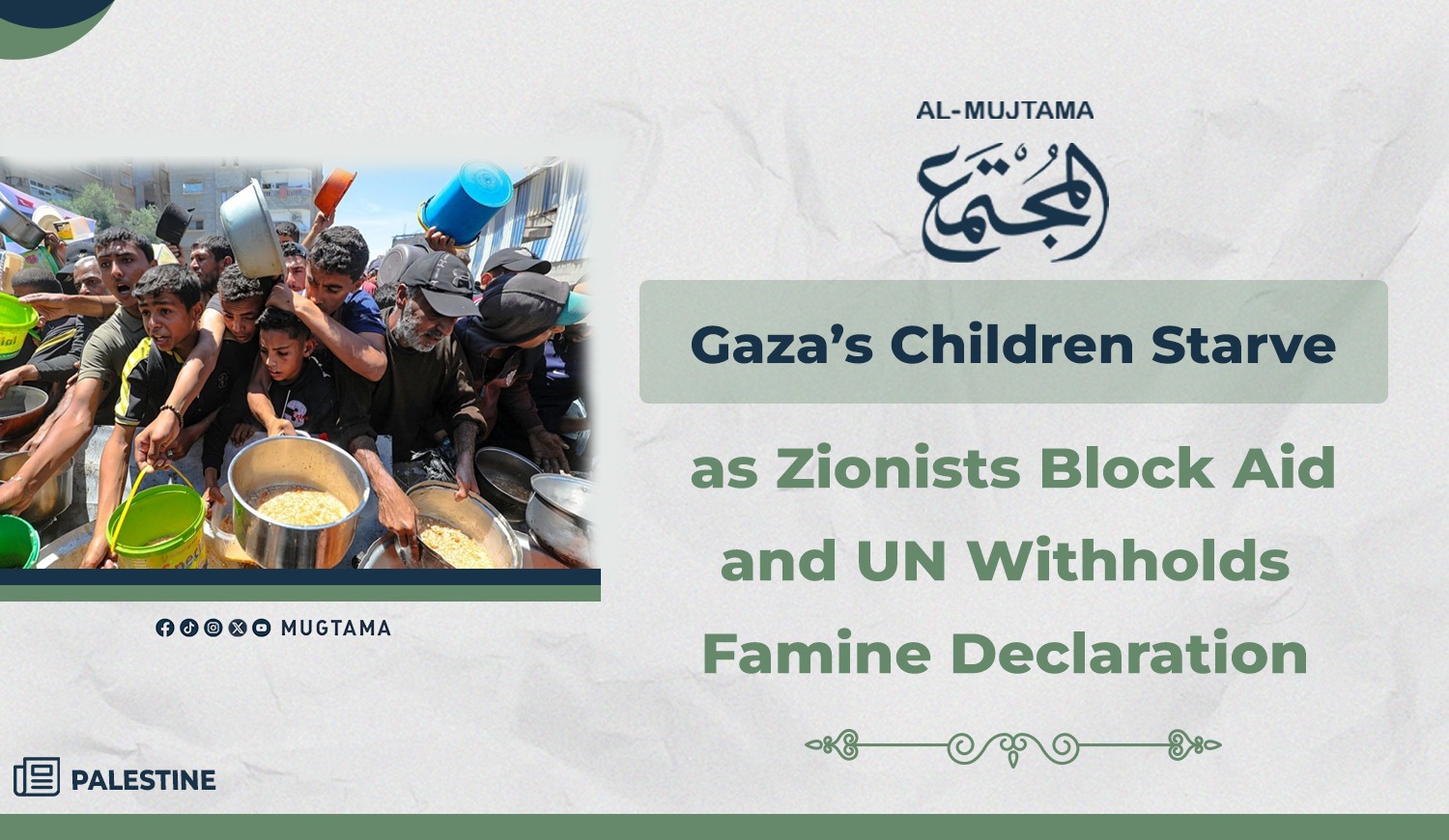Gaza... Childhood buried and dreams fading in an ongoing crime against humanity.

In
the Gaza Strip, childhood bears no resemblance to what the rest of the world
knows. Children there do not play in peace, nor do they go to school safely or
sketch their dreams in colorful notebooks. Instead, they live under relentless
bombardment as the ongoing Israeli war rages on. They dwell in tents for the
displaced, under the shadow of a suffocating siege, deprived of even their most
basic rights.
What
is happening in Gaza is not a natural disaster — it is a systematic crime
against humanity, carried out daily against a defenseless population, with
children at the forefront whose lives have been turned completely upside down.
The
children of Gaza, who before the war used to go to school, receive their
education, and line up in orderly rows for morning assembly, now find
themselves standing in lines at charity kitchens, waiting for a meal—or queuing
for a small amount of water to quench their thirst. Thousands of them have lost
their parents and have become the sole providers for their siblings, burdened
with responsibilities far beyond their years.
Al-Mujtama’
magazine’s correspondent in Gaza met with several children as they searched for
a glimpse of life after surviving the Israeli bombardment.
Twelve-year-old
Mohammed Abu Kamil says the war has completely changed his life. Before it
began, he would wake up early, go to school, attend his classes, then return
home to do his homework and live his life like any other child in the
world—playing and having fun with his friends. He notes that while life in Gaza
was difficult even before the war, it was still manageable and far better than
it is now; everything has changed entirely.
He
adds that he lost his home, his school, and his friends. Amid famine and the
lack of food, surviving an airstrike now marks the beginning of a new struggle:
the search for life and survival. His day revolves around finding a meal for
his family. He is forced to go to a charity kitchen that prepares and
distributes food to civilians, where he waits for hours under the scorching sun
and walks long distances just to bring back something to ease their hunger. He
shares that, at times, due to the overwhelming crowds and the sheer number of
people in need, he returns to his tent empty-handed—and they spend the night
without food.
Mohammed
also explained that there’s another line he must join—the water line. He stands
in front of a truck filled with potable water, waiting his turn to fill a
single jerrycan to quench his family’s thirst.
He
expressed his hope that the war would end soon so that the children of Gaza
could enjoy a dignified life and return to living, playing, and laughing like
other children around the world. Yet, at the same time, he wondered with
sadness: “How can life return to us when I’ve lost my friends, my home, my
toys—everything that made up my world?”
He
called on the relevant child welfare organizations to provide protection for
the children of Gaza who are subjected to various forms of torture, killing,
and starvation.
The
child Atiyah Al-Farra told "Al-Mujtama": He has become very scared
and suffers from many health issues due to the war and intense shelling and the
sounds of rockets falling on Gaza relentlessly, with loud explosions occurring;
this has caused him a state of panic and fear, especially during the nighttime
when the shelling peaks.
He
said that he spends most of the night awake due to fear and bombing, and as
soon as the sun rises, he rushes and travels long distances to provide water
for himself and his family. He is forced to carry more than one gallon because
the number of family members is large, and they distribute survival tasks among
themselves—some take care of providing water, others firewood, others food from
the soup kitchen, and so on for the family's needs.
Al-Farra
stressed that they are suffering from severe hunger, eating very little and
never feeling full because the food available to them is scarce. This has led
to extreme emaciation and noticeable weight loss among the children. He
urgently appealed for immediate intervention to stop the war and provide
protection for the children of Gaza.
As
for young Hassan Abu Shamala, he shared that he was forced to take on
responsibility at an early age after losing his father in the war. He has
become the sole provider for his family, with everything now falling on his
shoulders. To support them, he sells small bags of water in the streets, trying
to earn enough to buy food. However, he stressed that what he makes is barely
enough to afford anything due to the extreme inflation devastating the Gaza
Strip. Still, he does his best to provide even the simplest of meals for his
younger siblings.
He
added that he assigns his siblings different tasks—one goes to the charity
kitchen to get food, another fetches water—working together just to survive. He
emphasized that before the war, they lived a dignified life, provided for by
their father. But today, that life is gone—his father is gone, their home is
gone, and with them, everything beautiful in his life has vanished.
Since
the beginning of the Israeli war on the Gaza Strip in October 2023, statistics
from the Palestinian Ministry of Health and international organizations
indicate that more than 17,000 children have been killed as a result of Israeli
airstrikes. Thousands more have been seriously injured—many have lost limbs or
suffered permanent disabilities. In addition, thousands of children are
considered missing or have been buried beneath the rubble of their homes.
According to UNICEF reports, thousands more are suffering from severe
psychological trauma.











